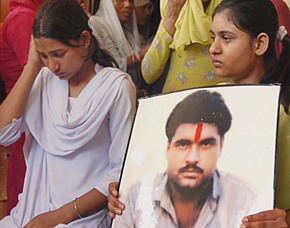
Islamabad, June 26: After being on the death row for 20 years over bombing charges, Indian national Sarabjit Singh is being released with Pakistan President Asif Ali Zardari today commuting his death sentence.
Zardari commuted Sarabjit's death sentence to life term which he has already completed having been in jail beyond 14 years. Therefore he is being released.
The 49-year-old Sarabjit, convicted and sentenced to death for alleged involvement in a string of bombings in Punjab in 1990 that killed 14 people has maintained his innocence and said that his was a case of "mistaken identity".
Zardari has directed authorities to release him if he has completed his prison term, official sources said.
Following the summary or official proposal issued by the presidency, law minister Farooq Naek today asked the interior ministry to take steps to "immediately" release Sarabjit as he had completed a life term, the sources told PTI.
Sarabjit could be released in the next few days after the interior ministry and the home department of Punjab complete necessary formalities, the sources said.
Sarabjit is currently being held at Kot Lakhpat Jail in Lahore.
President Zardari's action came a little over a month after ailing Pakistani virologist Khalil Chishti, detained in Rajasthan for nearly two decades on the charge of involvement in a murder, was freed on the orders of India's Supreme Court so that he could meet his family in Karachi.
Sarabjit had sent a fresh clemency appeal to President Zardari last month after the release of Chishti.
The mercy petition included a document with the signatures of 100,000 Indians that urged Zardari to reciprocate the release of Chishti by India.
Two letters addressed to Zardari by the chief cleric of Delhi's Jama Masjid, Syed Ahmed Bukhari, and the caretaker of the shrine of Sufi saint Khwaja Moinuddin Chishti, Syed Muhammad Yamin Hashmi, were also attached to the petition.
Sarabjit has maintained that his was a case of mistaken identity, since even the FIR was not registered in his name.
"I have spent 22 years in prison for a crime I have not committed," he wrote in the petition.
Sarabjit's sister Dalbir Kaur too has contended that she has "vital evidence" which proves her brother's innocence.
Sarabjit was given the death sentence under Pakistan's Army Act. A mercy petition sent by him to the then army chief was rejected with a direction that it should be forwarded to the President.
Though Sarabjit was set to be hanged in 2008, Pakistani authorities put off his execution indefinitely after former premier Yousuf Raza Gilani intervened. His family has said he wandered across the border in an inebriated condition and was arrested by Pakistani authorities.
Reacting to the news of Sarabjit's pardon, human rights activist Ansar Burney, who has been campaigning for his release, said, "I think its great news for India, Pakistan and the family of Sarabjit. I would like to congratulate and I would also like to thank the President of Pakistan Mr Zardari.
"...It will create some more love, some more affection. It will be very good for the peace process between the two countries and the region. So its very good news. I'm very happy today that he will be with his family soon."





Comments
Add new comment